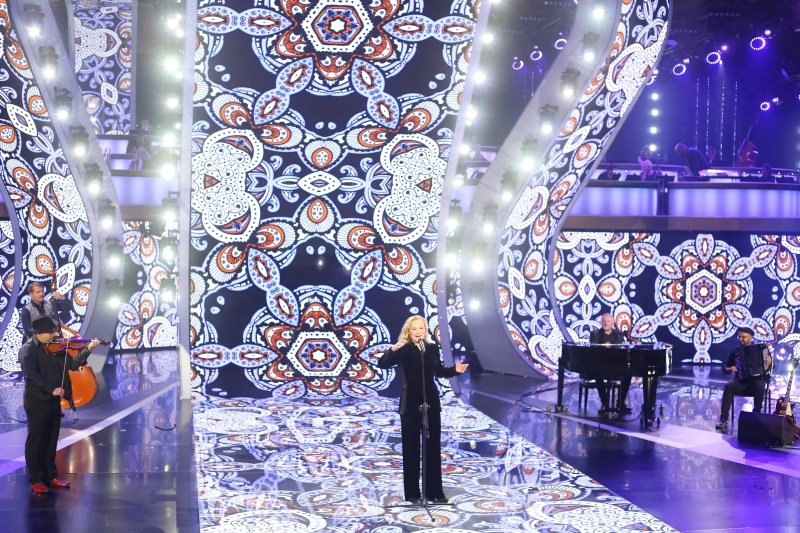Today marks the 70th anniversary of the birth of singer Edyta Geppert, an artist with both Polish and Hungarian heritage. Although the renowned Polish vocalist was born and raised in Nowa Ruda in southern Poland, her mother was a native Hungarian. "At home, we all spoke Hungarian. I did too, until I started school. I still understand the language, although speaking it wouldn't be easy for me," the artist reminisced in one of her interviews. In another conversation, she revealed that when she gave birth to her son, she immediately hummed him beautiful melodies: traditional Polish and Hungarian songs.

Singer Edyta Geppert on stage during the second day of the 57th National Festival of Polish Song in Opole, 2020. Photo by PAP/Sławomir Mielnik
The grandparents and mother of one of the most outstanding Polish vocalists moved from Hungary to Poland in 1951. They settled in Nowa Ruda, a small town in Lower Silesia that, in the 1950s, was an ethnic melting pot where Polish, Czech, Romanian, French, and other children grew up together. Two years later, Edyta Geppert was born and grew up surrounded by music. "The whole house resonated with singing from early morning. Mine, my mom Zyta's, and grandma Olga's. Of course, in Hungarian," the artist recalled in an interview with Pomponik.pl, revealing that as she grew up, her mom and grandma constantly sang romances in the rhythm of czardas, among other things. Meanwhile, her grandfather played folk songs from the Balkans on the record player. He quickly taught his beloved granddaughter to play the accordion.
The omnipresent Hungarian language
The Hungarian language was not only frequently sung but also spoken in Edyta Geppert's home. "At home, we all spoke Hungarian. I did too, until I went to school. I still understand this language, although speaking it wouldn't be easy for me," she shared in an interview with kobieta.pl, nostalgically recalling holidays and family celebrations at her grandmother's house with traditional Hungarian songs and dances.
As a child, Edyta Geppert performed in the Song and Dance Ensemble "Nowa Ruda." During the entrance exam for the Singing Department of the Fryderyk Chopin Music School in Warsaw, she sang two songs: the first was "Sztuczny miód" with lyrics by Agnieszka Osiecka, and the second was a song in the Hungarian language. She officially debuted in 1984 at the Acting Song Review in Wrocław, where she won the first prize. In the same year, she was honored with the Grand Prix at the 21st National Festival of Polish Song in Opole. She gained great fame, especially with the song "Jaka róża, taki cierń" ("Like the Rose, Like the Thorn").
The singer triumphed several times at the Opole festival: she is the only vocalist to have won the Grand Prix four times in the city! Her first album quickly achieved "gold" status, and the hit "Och, życie kocham cię nad życie" has been hummed by successive generations of Poles for decades.
While singing "Och, życie kocham cię nad życie" ("Oh, life, I love you more than life itself") in 1986, the artist captivated not only the audience in Opole but also listeners throughout Poland. Source: YouTube
Hungarian Dances and Culinary Delights from the Ancestral Country
Both the grandparents and the artist's mother avoided discussing why they had to emigrate from Hungary. However, as mentioned in an interview, the singer's grandfather used to bring back a lot of records after each trip from Hungary, "mostly folk music: czardaszes, Gypsy songs."
The Polish-Hungarian singer also sang Polish and Hungarian songs to her son, Mietek, from a young age. She wanted Mieczysław to "be aware of his origin and know, even from stories, about his ancestors," as a friend of the singer shared with Pomponik.pl. As Edyta Geppert revealed in an interview with the weekly "Niedziela," she no longer remembers the recipes for Hungarian delicacies. "I regret it very much because her cake – koldos tarta – was my favorite," noted the artist.
In 2007, Edyta Geppert received the Silver Medal "Meritorious for Culture - Gloria Artis" from Minister Kazimierz Ujazdowski. Two years later, in March 2009, at the Royal Castle in Warsaw, the President of the Republic of Poland, Lech Kaczyński, awarded her the Knight's Cross of the Order of Polonia Restituta.
(J)
